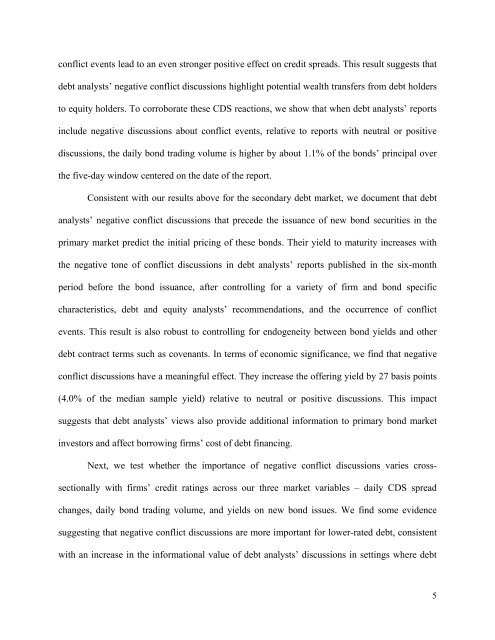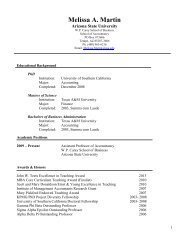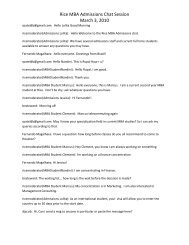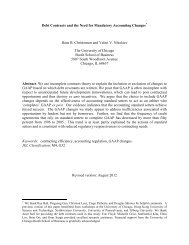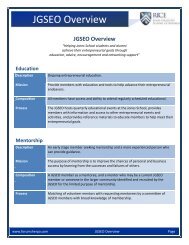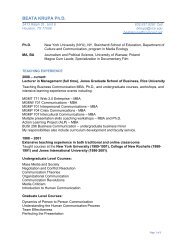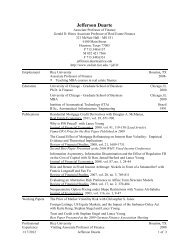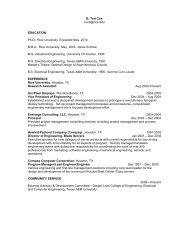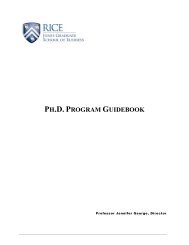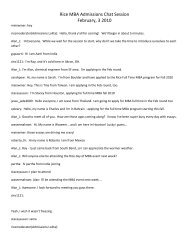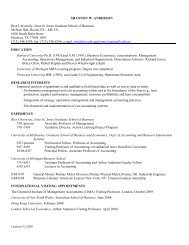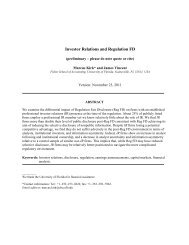Debt Analysts' Views of Debt-Equity Conflicts of Interest
Debt Analysts' Views of Debt-Equity Conflicts of Interest
Debt Analysts' Views of Debt-Equity Conflicts of Interest
Create successful ePaper yourself
Turn your PDF publications into a flip-book with our unique Google optimized e-Paper software.
conflict events lead to an even stronger positive effect on credit spreads. This result suggests that<br />
debt analysts’ negative conflict discussions highlight potential wealth transfers from debt holders<br />
to equity holders. To corroborate these CDS reactions, we show that when debt analysts’ reports<br />
include negative discussions about conflict events, relative to reports with neutral or positive<br />
discussions, the daily bond trading volume is higher by about 1.1% <strong>of</strong> the bonds’ principal over<br />
the five-day window centered on the date <strong>of</strong> the report.<br />
Consistent with our results above for the secondary debt market, we document that debt<br />
analysts’ negative conflict discussions that precede the issuance <strong>of</strong> new bond securities in the<br />
primary market predict the initial pricing <strong>of</strong> these bonds. Their yield to maturity increases with<br />
the negative tone <strong>of</strong> conflict discussions in debt analysts’ reports published in the six-month<br />
period before the bond issuance, after controlling for a variety <strong>of</strong> firm and bond specific<br />
characteristics, debt and equity analysts’ recommendations, and the occurrence <strong>of</strong> conflict<br />
events. This result is also robust to controlling for endogeneity between bond yields and other<br />
debt contract terms such as covenants. In terms <strong>of</strong> economic significance, we find that negative<br />
conflict discussions have a meaningful effect. They increase the <strong>of</strong>fering yield by 27 basis points<br />
(4.0% <strong>of</strong> the median sample yield) relative to neutral or positive discussions. This impact<br />
suggests that debt analysts’ views also provide additional information to primary bond market<br />
investors and affect borrowing firms’ cost <strong>of</strong> debt financing.<br />
Next, we test whether the importance <strong>of</strong> negative conflict discussions varies cross-<br />
sectionally with firms’ credit ratings across our three market variables – daily CDS spread<br />
changes, daily bond trading volume, and yields on new bond issues. We find some evidence<br />
suggesting that negative conflict discussions are more important for lower-rated debt, consistent<br />
with an increase in the informational value <strong>of</strong> debt analysts’ discussions in settings where debt<br />
5


